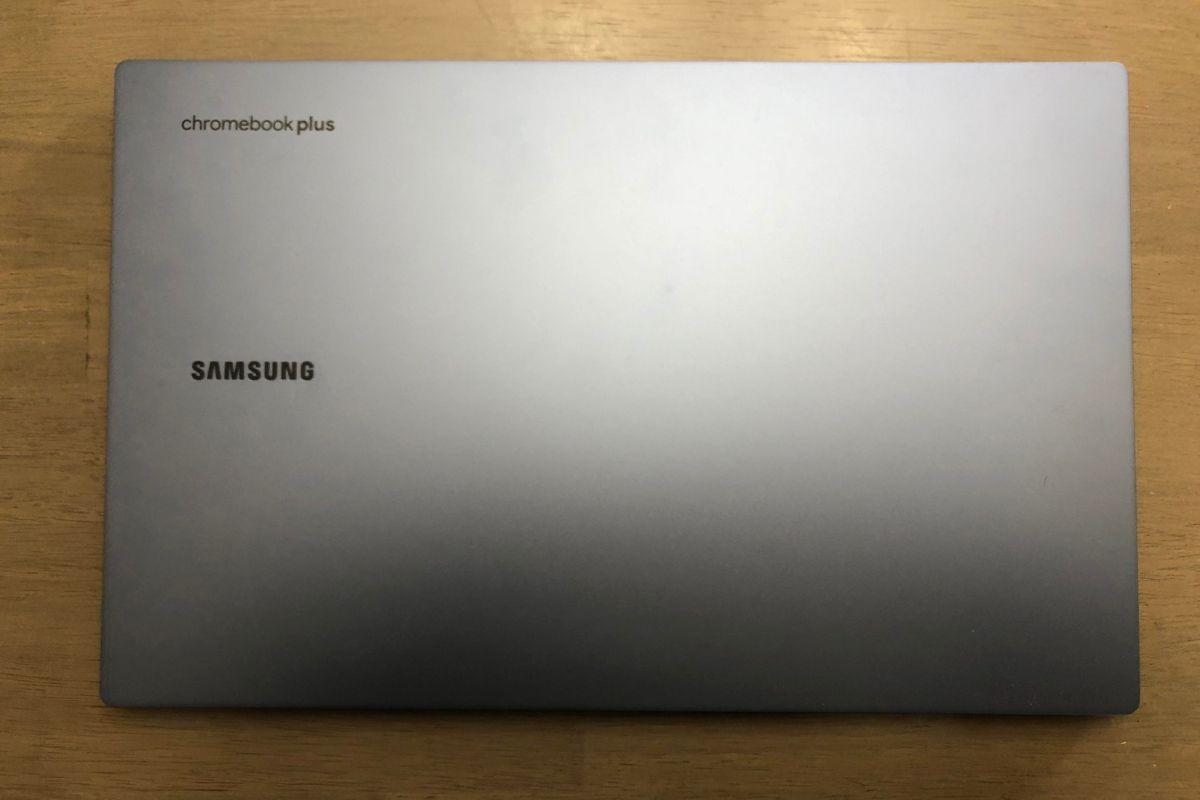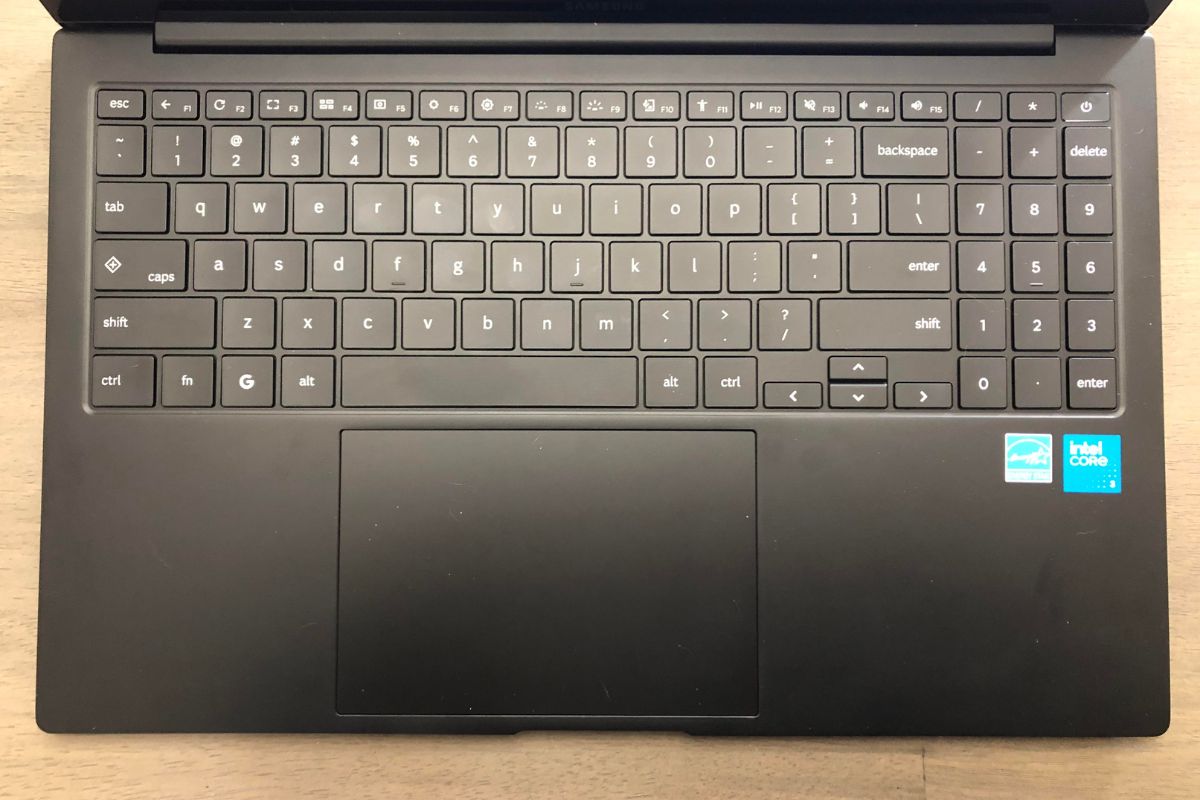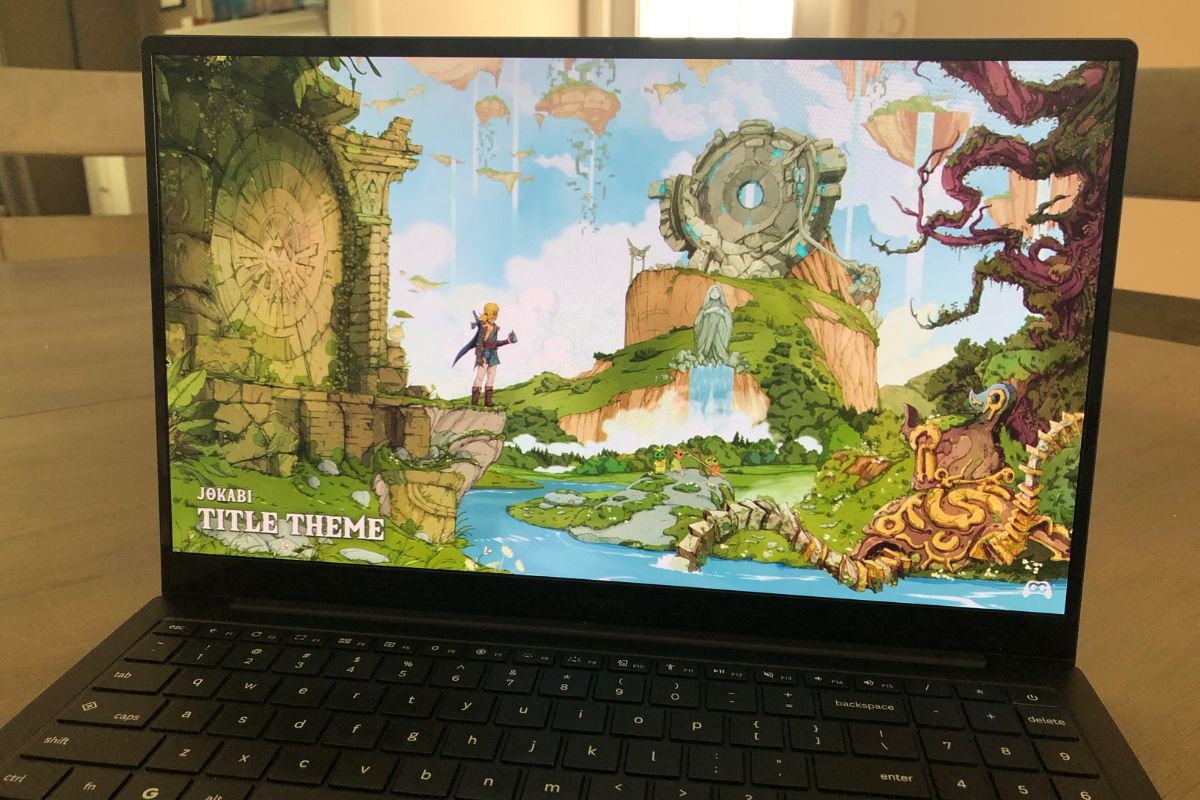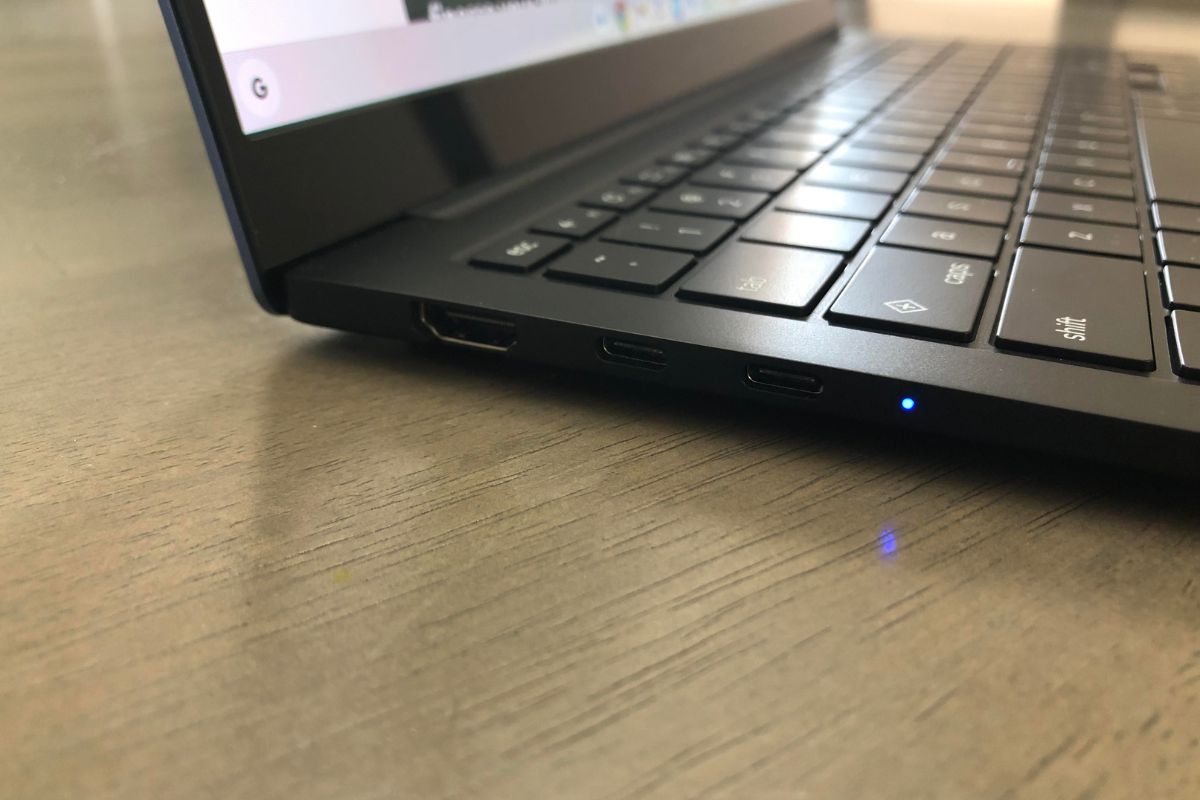Expert’s Rating
Pros
- Cool design
- Thin and lightweight
- Speedy performance
Cons
- No touchscreen
- Expensive
- Battery life isn’t great
Our Verdict
The Samsung Galaxy Chromebook Plus offers strong processing performance as well as a paper-thin design. However, battery life could be better and it’s missing a few premium features I expected to see given the price of this laptop.
Price When Reviewed
This value will show the geolocated pricing text for product undefined
Best Pricing Today
Price When Reviewed
$699.99
Best Prices Today: Samsung Galaxy Chromebook Plus
$699.99
$699.99
When it comes to premium laptops, the new Samsung Galaxy Chromebook Plus ticks off a lot of boxes. It’s thin and light, day-to-day performance is snappy and efficient, and the OLED display is both beautiful and big. It’s one of the Chromebook Plus models, which feature faster processors along with more RAM and storage.
Although Samsung makes quite the impression with this Chromebook, there are still a few flaws to be found. For one, it’s pretty expensive for a Chromebook, especially for one without a touchscreen. The other is the offset keyboard, which I struggled with. Nitpicks aside, I have to hand it to Samsung for creating one of the thinnest Chromebooks I’ve ever worked with. That’s no small feat!
Further reading: Best Chromebooks 2024: Best overall, best battery life, and more
Samsung Galaxy Chromebook Plus: Specs and features
The Samsung Galaxy Chromebook Plus comes in just one configuration (as far as I’m aware). Inside you’ll find an Intel Core 3 100U processor, 8GB of RAM, and 256GB of SSD storage. You’re also getting a 15.6 inch 1080p display, a 1080p webcam, and a 68Wh battery. It’s currently available at Samsung for $699.99. For further details, check out the specifications list below:
- CPU: Intel Core 3 100U
- Memory: 8GB
- Graphics: Intel Graphics
- Display: 15.6 inch AMOLED, 1920×1080, 60Hz (non-touch)
- Storage: 256GB SSD
- Webcam: 1080p
- Connectivity: 1 HDMI, 2 USB-C, 1 USB-A 3.2, microSD, 1 3.5mm audio jack
- Battery capacity: 68Wh
- Dimensions: 225.8 x 355.4 x 11.8 mm
- Weight: 2.58 pounds
- MSRP: $699
The ‘Neptune Blue’ colorway is beautiful and changes depending on the lighting conditions, a bit like Princess Aurora’s changing dress in Sleeping Beauty.
Samsung Galaxy Chromebook Plus: Design, build quality

IDG / Ashley Biancuzzo
When I removed the Galaxy Chromebook Plus from the box it came in, I was genuinely surprised by its thinness. My colleague Michael Crider, who had the chance to look at this laptop before I got my hands on it, couldn’t help but comment on its sleekness. It weighs 2.58 pounds and measures 0.46 inches at the thickest point of the laptop. As someone who likes to work in different rooms throughout the day (I work remote, by the way!), the laptop never weighed me down or was bothersome to carry. It’s even easy enough to carry in one hand, though I don’t recommend doing that with any laptop.
The “Neptune Blue” colorway is beautiful and changes depending on the lighting conditions, a bit like Princess Aurora’s changing dress in Sleeping Beauty. In natural lighting, namely with the sun streaming in through my kitchen window, the chassis appeared dark blue like the deep ocean. But when I snapped a photo of the laptop with the flash turned on, the chassis looked more silver than blue. It’s a cool effect. I don’t believe I’ve seen such an effect on other laptops, so kudos to Samsung on that one!
Samsung Galaxy Chromebook Plus: Keyboard, trackpad

IDG / Ashley Biancuzzo
The offset keyboard (number pad included) took some getting used to because it’s bigger than the keyboard I use on a daily basis (my personal laptop measures 13 inches), but once I got into a groove, I was typing just fine at my usual pace. That said, the backspace key remained a point of frustration for me, as it sits right next to the number pad.
I don’t have a number pad on my personal laptop keyboard, so I kept accidentally hitting the plus and minus keys whenever I deleted a typo. The inclusion of a number pad is great if you’re into crunching numbers, but unnecessary for someone like me (who works primarily with words).
I felt the need to make use of the Quick Insert key (aka the caps key) because I’m a millennial and I’m contractually obligated to intimately know the art of the gif response. Pressing the insert key will bring up a small(ish) menu. Not only do you get quick access to gifs, but also Google Drive and Google AI, which can help you write a thank you note. It’s a neat feature, but one I didn’t use for anything aside from sending gifs and calculating a mathematical equation or two.
The trackpad is enormous and takes up a lot of space beneath the keyboard. It’s not a haptic trackpad, which vibrates, emulating the feel of physical buttons. It’s just a traditional one. I don’t have strong opinions on either traditional or haptic trackpads, so I didn’t mind it, but some folks really stand by the haptic variety. In use, the trackpad responds well to taps and swipes. In fact, I had an easier time using the trackpad than I did using the keyboard.
Samsung Galaxy Chromebook Plus: Display, webcam, speakers

IDG / Ashley Biancuzzo
The 1920×1080 AMOLED display is large and commanding at 15.6 inches, and the bezels are so skinny they’re barely there. The picture it produces is sharp and bursting with color, but that’s no surprise, as Samsung is known for making quality displays. When I watched Beetlejuice Beetlejuice (yes it’s available to stream already), a movie that’s chockful of dark scenes, I was surprised by the amount of detail I could see in those scenes, especially when the camera panned over Adam Maitland’s model town in the beginning.
The picture quality of this display is excellent, but I’m bummed it’s not a touchscreen. The Samsung Galaxy costs $699.99 at MSRP, which is expensive for a Chromebook, so I had higher expectations from the get-go. It’s not a massive deal-breaker, especially if you prefer a non-touch display, but it’s a little disappointing in my book. It’s marketed as a premium Chromebook, yeah? Shouldn’t Samsung have pulled out all the stops?
All Chromebook Plus models come with 1080p webcams, which is perfectly suitable for Zoom or Team meetings. When I turned on the 1080p webcam on the Samsung Galaxy, I was pleased to find that I didn’t look half-dead! I’m very fair-skinned, so I tend to absorb light and that makes me look like some pale creature from the shadows. The orange part of my sweater really popped as well. Overall, I was generally quite pleased with the webcam’s performance, though it sometimes looks darker at the edges of the frame.
As for the speakers, they’re fine but not excellent. I know that’s a lukewarm response, but laptop speakers often leave a little to be desired. Many of them are downward firing (the Samsung Galaxy included), so you lose the punchiness and clarity. That said, the speakers are serviceable when it comes to watching YouTube videos and listening to podcasts. If you’re watching a movie, I’d recommend plugging in a pair of headphones for a better audio experience.
Samsung Galaxy Chromebook Plus: Connectivity

IDG / Ashley Biancuzzo
The port selection is surprisingly diverse for such a thin machine. On the left side of the Samsung Galaxy, you’ll see two USB-C ports and one HDMI port. On the right side, you’ll find one USB-A port, one microSD port, and one 3.5mm audio jack. The inclusion of USB-A and HDMI is especially impressive, as the slots for them are both tall and wide. You can do a lot of useful things with this laptop like hook up to a monitor (via HDMI) or offload files and photos (via microSD).
Samsung Galaxy Chromebook Plus: Performance
The Intel Core 3 100U mobile processor that’s driving this machine is quick and efficient. There’s evidence of that in my day-to-day use, which includes binge watching Netflix’s Outlander, writing e-mails, browsing social media, and writing in Google Docs. I didn’t notice slow renderings or any lag when leap-frogging from one open tab to another. The processor uses the Raptor Lake-U architecture, which was first introduced in January 2024. It has a total of six cores and eight threads. Depending on what you’re doing, it’s capable of boosting up to 4.7GHz.
We ran our usual suite of browser-based Chromebook benchmarks and here are the scores:
- CrXPRT 2: 170
- Speedometer 2.0: 318
- Basemark Web 3.0: 1335.19
- Kraken: 428.7ms
- Jetstream 2: 294.324
These are great scores! Based on those numbers alone, performance is comparable to the Lenovo Flex 5i Chromebook Plus, which features an Intel Core i3-1315U CPU. The Lenovo Flex 5i has a CrXPRT 2 score of 177, which is 4.1 percent faster than the Samsung Galaxy Chromebook Plus. By the way, the CrXPRT 2 benchmark determines how fast a Chromebook handles day-to-day tasks like completing homework assignments, editing pictures, and so on. That said, the difference is marginal. I doubt you’d be able to spot the difference in performance between the two machines.
The Lenovo Flex 5i Chromebook Plus is a tiny bit faster than the Samsung Galaxy Chromebook Plus, sure, but both offer equally strong day-to-day performance. The Samsung Galaxy is well-equipped as far as hardware is concerned.
Further reading: How we test laptops at PCWorld
Samsung Galaxy Chromebook Plus: Battery life
Samsung claims you can get 13 hours of battery life out of this machine, but I didn’t quite reach that number in my everyday use. The number I reached was closer to eight hours, which isn’t a poor result by any means. That said, not only do I turn up the brightness because my eyesight stinks, but I also have loads of tabs open, both of which ultimately impact the battery life. When I put the Samsung Galaxy Chromebook Plus through CrXPRT 2’s battery benchmark, however, I got a better result.
The Samsung Galaxy Chromebook Plus died in about 12 hours. It’s close enough to Samsung’s original claim, but I did lower the brightness to 50 percent and turned off the keyboard’s backlighting, which may explain the jump. The Acer Chromebook Plus Spin 714, on the other hand, costs about the same as the Samsung Galaxy Chromebook Plus, performs similarly, and lasted 15.1 hours on a single charge. Do I wish for better battery life? Of course! Chromebooks are generally known for their long battery lives, so I was a bit surprised by this result. It’s not the end of the world but for a $700 Chromebook, I expected better.
Samsung Galaxy Chromebook Plus: Conclusion
The Samsung Galaxy Chromebook Plus is an exciting, if not explosive entry in the world of Chromebooks. It’s almost paper thin, making it a fantastic portable option for those who are always on-the-go, and it’s so lightweight you’ll barely notice it’s there inside your bag. While day-to-day performance is lightning fast and the unique colorway will no doubt turn heads, you’ll be in for a learning curve with the keyboard and the Quick Insert key is hardly a necessary feature. The AMOLED display, though it produces a beautiful picture, doesn’t have touch capabilities, which is a disappointment given the high price of this machine.
The Samsung Galaxy Chromebook Plus is a near-perfect device, but the cost ($699.99 at MSRP) is a little too high for a laptop without a touchscreen, a premium feature I’d expect to see in this price range. There’s always a fracture in the marble statue, yeah? Wait for a sale before committing to the buy button. Until then, you may want to check out the Acer Chromebook Plus Spin 714, which is the same price as the Samsung Galaxy Chromebook Plus, but features a touchscreen and a 2-in-1 form factor.



